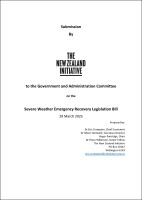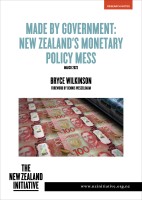
The case against a predatory wealth tax
The Green Party’s proposed wealth tax plays to greed and envy. It blithely proposes that everyone can be lifted out of poverty by imposing a heavy wealth tax on a mere 0.7% of the population. Read more

Bryce is a Senior Fellow at The New Zealand Initiative and the Director of the Wellington-based economic consultancy firm Capital Economics.
Prior to setting up his consultancy in 1997, he was director, and shareholder in First NZ Capital. Before moving into investment banking in 1985, he worked in the New Zealand Treasury, reaching the position of Director.
Bryce holds a PhD in Economics from the University of Canterbury and was a Harkness Fellow at Harvard University. He is a Fellow of the Law and Economics Association of New Zealand.
Phone: +64 4 499 0790

The Green Party’s proposed wealth tax plays to greed and envy. It blithely proposes that everyone can be lifted out of poverty by imposing a heavy wealth tax on a mere 0.7% of the population. Read more

When I was a lad in the 1950s, I absorbed from adults the notion that it was shameful to be reduced to applying for a state handout. Self-reliance was virtuous. Read more

Last week’s government Budget increased projected government operating spending over the next four years by $8.4 billion while projected revenue fell by $10.7 billion. Projected government borrowing rose by $20 billion. Read more
The state sector is widely failing to meet the public’s expectations. One problem is inadequate accountability due to confused objectives. Read more

In this thought-provoking episode, the Initiative’s economists – Dr Oliver Hartwich, Dr Eric Crampton, Dr Tony Burton, and Dr Bryce Wilkinson – dive into the debate over whether Australia is a better option for skilled talent. They discuss the current challenges faced by New Zealand in terms of health, education, and infrastructure, and how the nation's performance is deteriorating relative to Australia. Read more

An IRD report on effective rates of tax attracted much public attention last week. It was launched by the Minister of Revenue, David Parker. Read more

New Zealanders are lucky to live in a country which ranks towards the top globally for compliance with the rule of law. We owe this rich heritage to our predecessors. Read more

Who really cares about the wellbeing of future generations? Those who do should care greatly about productivity growth. Read more

In recent years, threats to freedom of speech have intensified. The Posie Parker brawl last Saturday is just the latest example in the culture war around free speech. Read more

This submission in response to the Severe Weather Emergency Recovery Legislation Bill is made by The New Zealand Initiative (the Initiative), a Wellington-based think tank supported primarily by major New Zealand businesses. Read more

Heather du Plessis-Allan on Newstalk ZB asks Finance Minister Grant Robertson about his thoughts on the points raised in Dr Bryce Wilkinson's latest report, Made by Government: New Zealand's Monetary Policy Mess.
Read more

Inflation is a problem for the first time in 30 years. Property prices have whiplashed. Read more

Central banks, above all, are responsible for overseeing financial stability and controlling inflation. Many central banks, including the Reserve Bank of New Zealand (RBNZ), have inadvertently fueled excessive inflation through their responses to Covid-19, resulting in massive losses on taxpayers. Read more

Nathan Rarere and Anan Zaki report on Bryce Wilkinson's new report Made by Government: New Zealand's Monetary Policy Mess. Read more

In his new report, Made by Government: New Zealand's Monetary Policy Mess, Dr Bryce Wilkinson highlights the mess the Government/Minister of Finance and the Reserve Bank of New Zealand (RBNZ) have made of monetary policy. Inflation is once more a real problem, property prices have whiplashed and taxpayers have lost $9 billion. Read more